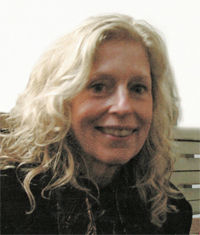 The Dread Essay
The Dread Essay
Prologue: The Hurry
When the witches of time assembled
the dust in their skirts and petticoats whispered
foul things. The air stirred as before
a terrible storm though the sky stayed blue
as their sky-deep eyes. They had stump teeth,
snag teeth, shards impeding their long blunt tongues.
The spell they meant to cast would last for centuries.
Men would think themselves powerful, forgetting
the hard fact of the empty skull. Women
would heed their call, so mindful of time their faces
would wind down like clocks. We give birth
to death, the witches would chant. Or their blood
would chant, words slurred by repetition. The stains
on their bodices said they toiled hard, summer
or winter, and ate with the greed of insects
let loose in clouds over fields where the air
stirred before the next storm. Listen to the wind
at your back, they called, and she ran faster, she tried
everything she could to keep up with the wind
that held nothing, offered nothing, knew no signal
for Help, for Help him live.
Body I: The Missing
Every morning, she could feel her dread
drag up the mountain behind her. She sensed its shadow,
tenacity. It never made itself manifest, but it was there,
in the way hair is there, or fingernails,
the folds of skin at the elbow—
It was a hard year. Her son was fighting a war
one soldier described thus: We just drive around
waiting to be blown up. The phone seemed menace
though she knew there would be dark figures at the door.
A crow's shadow sufficed to make her shudder.
Her son wrote from Sinjar. He could see sheep
in the valley, a green valley. Hard to believe it was a war
zone, he added. Crows flew over the meadow,
making her shudder. Other things occurred, but it was
the crows, the green valley she saw everywhere.
A hard year. The war displaced more and more
while those who stayed were afraid to go into the streets
to gather the dead. Tens, hundreds, hundreds
of thousands died: hard to tell. Reporters feared for their lives
if they left their hotels. Dogs roamed the streets
with human bones in their mouths. A general lack
of electricity: They can get a man to walk on the moon,
someone said, but they can't get electricity
to us? She climbed the mountain, forcing herself
to listen for the hermit thrush—
Body II: Interlude
Silence came as if all the words
in all the books on the shelves,
all the words that had ever been
in their mouths, all the words
spoken in the house by others
who had lived there before them—
all those words had broken
apart, quietly, like the cloth
of old coats and dresses rotting
in the attic. The man kept chewing,
lifting his fork and chewing. The woman
put more rice on their plates.
The birds went quiet for the night. It was the fifth
anniversary of the beginning
of the war. They thought they should say
something worthy of the deaths
and suffering but could think of nothing
but how they loved their son, troubled
to think such love could not save him,
troubled to hear their fear in silence.
Body III: Homecoming on the Evening News
All people saw was the carnage,
the wreckage,
the soldier said, but there was other stuff
they should know,
the elementary school
soldiers just helped to open, foundations
they'd poured for clinics and other schools,
the candy and gum
they gave the children. His wife,
who had not been able to watch
the news while he was gone,
stood at his side in wonder
at his body, his mouth, the words
he would whisper to her later
in the dark, the words he would not,
the secrets working their slow wreckage.
Body IV: Night Mission
Never has the world needed poetry more,
the poet says, and people sigh, and an angel
with wings dense as galaxies drifts
from one side of the auditorium to the other.
Half a world away, a soldier stares at his gun,
praying again that when he steps into the night,
the ground under his feet will remain
ground, will not explode into kill kill kill kill kill.
The general paces his quarters, seeing
his mother, alone in her living room
at night, reading. Not long ago
she died there, the book still open in her lap.
Sir, an aide begins. The general nods, thinking
there is this death and the other death. It seems
important to distinguish, but maybe all death
is the same. Either way, it's time.
Epilogue That Might Be Prologue, Body, Everything
Few people thought about the war.
But once her son was there, it was all
she could think, waking or sleeping.
War in her toothpaste and soap.
Her cereal and coffee. Soup.
War in the sweats she wore
to walk the dog. Her skirts or slacks,
her blouses, shoes. In the meadow
brown with autumn, in the first
scent of first snow, metallic, blunt,
like the gun he wrote he couldn't
sleep without. She wrote to other
mothers. Was war everywhere
there, too? In the piercing of a
siren, in the needle through a cloth.
In home-baked bread, warm
on the tongue like pleasure
that would disappear. In the hollow
where he'd skated as a kid. In posters
on his walls, in the sign on his door:
Forbidden Zone. In his eyes,
when he finally came home.








